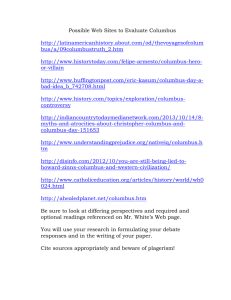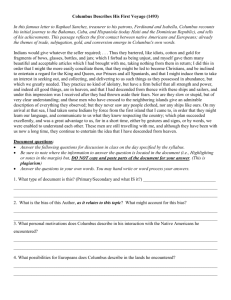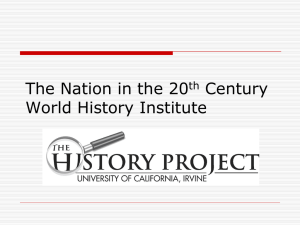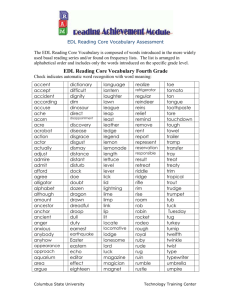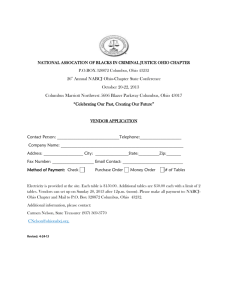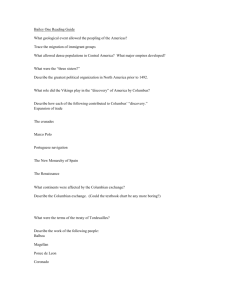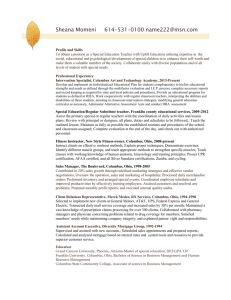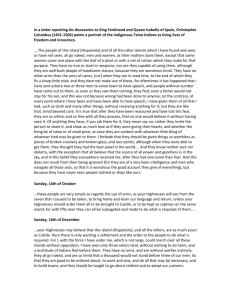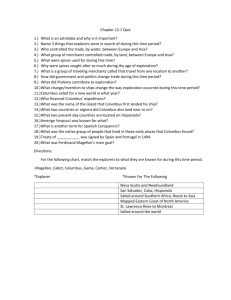Columbus Debate - United States History
advertisement
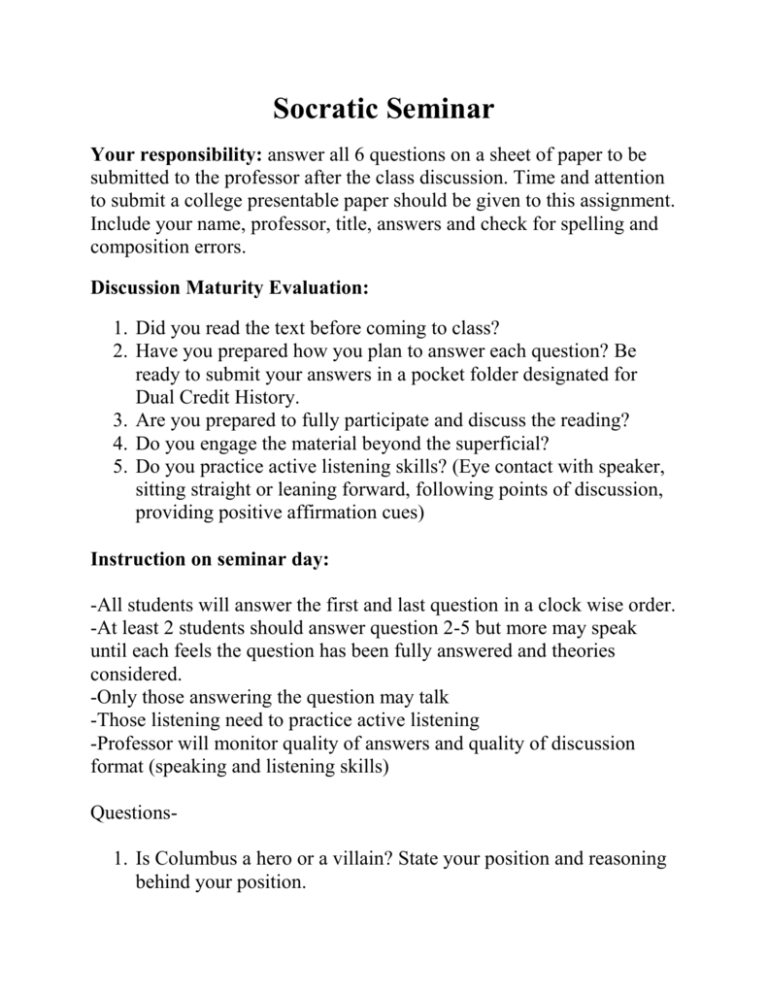
Socratic Seminar Your responsibility: answer all 6 questions on a sheet of paper to be submitted to the professor after the class discussion. Time and attention to submit a college presentable paper should be given to this assignment. Include your name, professor, title, answers and check for spelling and composition errors. Discussion Maturity Evaluation: 1. Did you read the text before coming to class? 2. Have you prepared how you plan to answer each question? Be ready to submit your answers in a pocket folder designated for Dual Credit History. 3. Are you prepared to fully participate and discuss the reading? 4. Do you engage the material beyond the superficial? 5. Do you practice active listening skills? (Eye contact with speaker, sitting straight or leaning forward, following points of discussion, providing positive affirmation cues) Instruction on seminar day: -All students will answer the first and last question in a clock wise order. -At least 2 students should answer question 2-5 but more may speak until each feels the question has been fully answered and theories considered. -Only those answering the question may talk -Those listening need to practice active listening -Professor will monitor quality of answers and quality of discussion format (speaking and listening skills) Questions1. Is Columbus a hero or a villain? State your position and reasoning behind your position. 2. If we evaluate Columbus based on these limited reading selections: then identify as what you consider to be the top four criteria by which you would evaluate the historical person on trial. 3. Walk through each reading: 3. Identify the two basic viewpoints behind the reading selection: does excerpt 1 represent a positive view of Columbus or a critical view of Columbus? What about excerpt 2? And so on… 4. What is the essential argument of those supporting a positive view of Columbus? What is the essential argument of those supporting a negative view of Columbus? 5. What considerations does this reading selection not address in the author’s assessment of Columbus? 6. As a result of Columbus’s voyage- how did the fate of the New World change? Answer by completing the following 2 lists. List direct consequences contributed by intent of Columbus- And indirect effects contributed by unintentional consequences of Columbus’s arrival to the New World. Where do I go to find the reading material? Reading Material posted to: http://mcaaphistory.yolasite.com/ Visit the Unit I page to view and/or print Should we celebrate Christopher Columbus as a national hero? Consider: motivations, actions (intended and unintended), results (short and long term). Columbus' Christian Character and Divine Mission By Editorial Staff Published April 2008 By Stephen McDowell MUCH CONTROVERSY HAS ARISEN over the celebration of the 500th anniversary of the discovery of America by Christopher Columbus. Many attacks have been leveled against him and western civilization. The target of the attacks of many is not so much against Columbus as it is against Christianity, which is the source of the values of western civilization. Fundamentally, the battle is between a Christian world view and a humanistic worldview. To properly understand Columbus and others involved in the discovery and colonization of the Americas, we must view them in light of the world in which they lived. While Columbus had many shortcomings, his motives were most certainly Christian. Washington Irving writes of Christopher Columbus: “He was devoutly pious: religion mingled with the whole course of his thoughts and actions, and shone forth in his most private and unstudied writings. Whenever he made any great discovery, he celebrated it by solemn thanks to God. The voice of prayer and melody of praise rose from his ships when they first beheld the New World, and his first action on landing was to prostrate himself upon the earth and return thanksgivings. Every evening the Salve Regina and other vesper hymns were chanted by his crew, and masses were performed in the beautiful groves bordering the wild shores of this heathen land. All his great enterprises were undertaken in the name of the Holy Trinity, and he partook of the communion previous to embarkation. He was a firm believer in the efficacy of vows and penances and pilgrimages, and resorted to them in times of difficulty and danger. The religion thus deeply seated in his soul diffused a sober dignity and benign composure over his whole demeanor. His language was pure and guarded, and free from all imprecations, oaths and other irreverent expressions.“1 Journal of First Voyage of Columbus Columbus’ actual journals have been lost, but two of his companions, his son Ferdinand and Bartolome Las Casas, recorded abstracts of the original journal. At places they quote Columbus and in other places they summarize his journals.2 Writings in Columbus’ journal reveal his primary motives for sailing were his Christian convictions. He had a desire to preach the gospel throughout the nations, and in particular to take Christianity to the Great Khan of eastern Asia. About 200 years before Columbus’ voyage, Marco Polo, who had traveled throughout parts of Asia, brought word from the Khan of a desire for missionaries to be sent to his empire. Other Khans who had ruled since Polo’s time had also made this request. Columbus had studied the writings of Marco Polo’s travels and was also familiar with more recent requests for missionaries to be sent to teach the Christian religion. He opens his journal of his first voyage with the following: “In the Name of Our Lord Jesus Christ. Whereas, Most Christian, high, Excellent and Powerful Princes, King and Queen of Spain and of the Islands of the Sea, our Sovereigns, this present year 1492, after your Highnesses had terminated the war with the Moors reigning in Europe, the same having been brought to an end in the great city of Granada, where on the second day of January, this present year, I saw the royal banners of your Highnesses planted by force of arms upon the towers of the Alhambra, which is the fortress of that city, and saw the Moorish king come out at the gate of the city and kiss the hands of your Highnesses, and of the Prince my Sovereign; and in the present month, in consequence of the information which I had given your Highnesses respecting the countries of India and of a Prince, called Great Can, which in our language signifies King of Kings, how at many times he, and his predecessors had sent to Rome soliciting instructors who might teach him our holy faith, and the holy Father had never granted his request, whereby great numbers of people were lost, believing in idolatry and doctrines of perdition. “Your Highnesses, as Catholic Christians, and princes who love and promote the holy Christian faith, and are enemies of the doctrine of Mahomet, and of all idolatry and heresy, determined to send me, Christopher Columbus, to the above-mentioned countries of India, to see the said princes, people, and territories, and to learn their disposition and the proper method of converting them to our holy faith; and furthermore directed that I should not proceed by land to the East, as is customary, but by a Westerly route, in which direction we have hitherto no certain evidence that any one has gone…” After reaching land, which he thought were islands off the east coast of Asia (or India), Columbus saw many natives, whom he called Indians. He spoke often of his desire to convert them to Christianity. Friday, Oct. 12th…“As I saw that they were very friendly to us, and perceived that they could be much more easily converted to our holy faith by gentle means than by force, I presented them with some red caps, and strings of beads to wear upon the neck, and many other trifles of small value, wherewith they were much delighted and became wonderfully attached to us… I am of opinion that they would very readily become Christians, as they appear to have no religion.” Tuesday, Oct. 16th…. “They have no religion, and I believe that they would very readily become Christians as they have a good understanding.” Tuesday, Nov. 6th… “I have no doubt, most serene Princes, says the Admiral, “that were proper devout and religious persons to come among them and learn their language, it would be an easy matter to convert them all to Christianity, and I hope in our Lord that your Highnesses will devote yourselves with much diligence to this object, and bring into the church so many multitudes, inasmuch as you have exterminated those who refused to confess the Father, Son and Holy Ghost [this refers to the conflict with the Moors], so that having ended your days (as we are all mortal) you may leave your dominions in a tranquil condition, free from heresy and wickedness, and meet with a favourable reception before the eternal Creator, whom may it please to grant you a long life and great increase of kingdoms and dominions, with the will and disposition to promote, as you always have done, the holy Christian religion, Amen.” Monday, Nov. 12th… “Your Highnesses should therefore adopt the resolution of converting them to Christianity, in which enterprise I am of opinion that a very short space of time would suffice to gain to our holy faith multitudes of people…” Tuesday, Nov. 27th… “The language of this people neither I nor any of my company understand, and we are perpetually making mistakes in our conversation with one another… Henceforth, with the permission of our Lord, I shall use my exertions, and have the language taught to some of our people, for I perceive that thus for the dialect is the same throughout. Thus we shall acquire a knowledge of all that is valuable here, and shall endeavour to convert to Christianity these people, which may be easily done, as they are not idolators, but are without any religion…. Your Highnesses ought not to suffer any trade to be carried on, nor a foreign foot to be set upon these shores except by Catholic Christians, as the object and sum of the present undertaking has been the increase and glory of the Christian religion.” Sunday, Dec. 16th… The Admiral ordered every civility to be shown them, “because,” as he observes, “these are the best and most gentle people in the world, and especially as I hope strongly in our Lord, that your Highnesses will undertake to convert them to Christianity, and that they may become your subjects, in which light, indeed I already regard them.” Monday, Dec. 24th… “Your highnesses may be assured that there is not upon earth a better or gentler people, at which you may rejoice, for they will easily become Christians and learn our customs. A finer country or people cannot exist, and the territory is so extensive and the people so numerous, that I know not how to give a description of them…” Many other actions and writings of Columbus, as revealed in his journal of the voyage, reveal his Christian motivation and reliance upon God. Wednesday, Dec. 12th… A large cross was set up at the entrance of the harbour, upon a beautiful spot upon the western side, “as an indication” in the words of the Admiral, “that your Highnesses possess the country, and principally for a token of Jesus Christ our Lord, and the honour of Christianity.” Columbus often gives thanks to God for good weather and providentially arranging the voyage and watching over him: Monday, Jan. 14th… He says that in spite of the bad state of his vessels he confides in our Lord, that as he has brought him to these parts, so he will in his great mercy return him; for his Heavenly Majesty knew what struggles it had cost him to set on foot this enterprise, and that he alone had favoured him before the King and Queen, all others in the most unreasonable manner opposing him. Wednesday, Jan. 23rd… The sea all the time smooth as a river, “many thanks be to God,” says the Admiral. Friday, Feb. 1st… The sea very smooth, “thanks to God,” says the Admiral. Saturday, Feb. 2nd… The sea very smooth, thanks to God, and the air soft. Thursday, Feb. 14th… He… comforts himself in reflecting upon the many mercies God had shown him in having enabled him to conquer all his adversities and hindrances in Castile, and accomplish his great discovery. And as he made the service of God the aim and business of his undertaking, and he had hitherto favoured him in granting all his desire, he indulges a hope that he will continue that favour, and secure him a safe arrival. Especially he reflected that he had delivered him when he had much greater reason for fear, upon the outward voyage, at which time the crew rose up against him, and with an unanimous and threatening voice, resolved to return back, but the eternal God gave him spirit and valour against them all. Columbus desired to use the profits from the voyages to finance the liberation of the Holy City, Jerusalem, from the control of the Moslems. This is mentioned in the following entry: Wednesday, Dec. 26th… He adds that he hopes to find at his return from Castile, a ton of gold collected by them in trading with the natives, and that they will have succeeded in discovering the mine and the spices, and all these in such abundance that before three years the King and Queen may undertake the recovery of the Holy Sepulcher. “For I have before protested to your Highnesses,” says he, “that the profits of this enterprise shall be employed in the conquest of Jerusalem, at which your Highnesses smiled and said you were pleased, and had the same inclination.” Las Casas’ abstract of Columbus’ Journal ends with this entry: Friday, March 15th… And here, the Admiral says, this relation ends, but that he purposes to go to Barcelona by sea, being informed that their Highnesses are in that city, there to give them an account of his voyage, in which our Lord had directed and enlightened him. For although he believed without scruple that the Almighty created all things good, that all is excellent but sin, and that nothing can be done without his permission, “yet,” he observes, “it has been most wonderfully manifested in the circumstances of this voyage, as may be seen by considering the many signal miracles performed throughout, as well as the fortune which has attended myself, who passed so long a time at the court of your Highnesses, and met with the opposition of so many of the principal persons of your household, who were all against me, and ridiculed my project. The which I hope in Our Lord will provide the greatest honour to Christianity ever accomplished with such ease.” Letter of Columbus to Rafael Sanchez After his arrival in Lisbon, Columbus wrote a summary account of his voyage as a report for Ferdinand and Isabella. It was written as a letter to Rafael Sanchez, Treasurer for Ferdinand and Isabella, and clearly reveals Columbus’ Christian motivation. The following quotes are from this letter: In his voyages, Columbus discovered many islands. He wrote, “I named the first of these islands San Salvador [which means holy saviour], thus bestowing upon it the name of our holy Saviour under whose protection I made the discovery.” Other names he chose included Trinidad [for the Trinity], and Monte Cristi. Columbus forbade his men from trading worthless articles to the Indians for things of value. He wrote: “I prohibited their traffic on account of its injustice, and made them many presents of useful things which I had carried with me, for the purpose of gaining their affection, in order that they may received the faith of Jesus Christ, be well disposed towards us, and inclined to submit to the King and Queen our Princes, and all the Spaniards, and furthermore that they may furnish us with the commodities which abound among them and we are in want of.” “Throughout these islands there is no diversity in the appearance of the people, their manner or language, all the inhabitants understanding one another, a very favourable circumstance in my opinion, to the design which I have no doubt is entertained by our king, namely to convert them to the holy Christian faith, to which as far as I can perceive they are well disposed.” Columbus ends this letter: “The great success of this enterprise is not to be ascribed to my own merits, but to the holy Catholic faith and the piety of our Sovereigns, the Lord often granting to men what they never imagine themselves capable of effecting, as he is accustomed to hear the prayers of his servants and those who love his commandments, even in that which appears impossible; in this manner has it happened to me who have succeeded in an undertaking never before accomplished by man. For although some persons have written or spoken of the existence of these islands, they have all rested their assertions upon conjecture, no one having ever affirmed that he saw them, on which account their existence has been deemed fabulous.” “And now ought the King, Queen, Princes, and all their dominions, as well as the whole of Christians, to give thanks to our Saviour Jesus Christ who has granted us such a victory and great success. Let processions be ordered, let solemn festivals be celebrated, let the temples be filled with boughs and flowers. Let Christ rejoice upon earth as he does in heaven, to witness the coming salvation of so many people, heretofore given over to perdition. Let us rejoice for the exaltation of our faith, as well as for the augmentation of our temporal prosperity, in which not only Spain but all Christendom shall participate.- Such are the events which I have described to you with brevity. Adieu.” 1 The Life and Voyages of Christopher Columbus, Washington Irving, (New York: Belford Company, n.d.,) pp. 632-633. 2 The following journal excerpts and quotes of Columbus are from the work of Las Casas, printed by Albert and Charles Boni, New York, 1924. GROUP 2 Document 1 When he arrived on Hispaniola in 1508, Las Casas says, "there were 60,000 people living on this island, including the Indians; so that from 1494 to 1508, over three million people had perished from war, slavery, and the mines. Who in future generations will believe this? I myself writing it as a knowledgeable eyewitness can hardly believe it...." Thus began the history, five hundred years ago, of the European invasion of the Indian settlements in the Americas. That beginning, when you read Las Casas-even if his figures are exaggerations (were there 3 million Indians to begin with, as he says, or less than a million, as some historians have calculated, or 8 million as others now believe?) is conquest, slavery, death. When we read the history books given to children in the United States, it all starts with heroic adventure-there is no bloodshed-and Columbus Day is a celebration. Source: Howard Zinn, The People’s History of the United States Document 2 This gallery [of heroes] was not in place at the birth of the political nation. America, as a young republic, found itself immediately in the middle of an identity crisis. Having effected a violent separation from England and its cultural and political icons, America was left without history--or heroes. Michael Kammen, in his Mystic Chords of Memory explains that "repudiation of the past left Americans of the young republic without a firm foundation on which to base a shared sense of their social selves." (65) A new national story was needed, . . . The human need to explain origins, to create self-identity through national identity, was thwarted …. A vacuum was created, and was slowly filled with the image of Christopher Columbus. Columbus was a perfect icon for the confusing days of the early nineteenth century, cutting across social, political, and regional boundaries, providing a kind of superficial unity for the American national identity, a decontextualized and increasingly monodimensional hero, created in the image of the age. Source: Online source of Columbus in History Document 3 "societies in fact reconstruct their pasts rather than faithfully record them" and do so "with the needs of contemporary culture clearly in mind." Source: Michael Kammen, Mystic Chords of Memory Document 4 The “Columbus Day” holiday is the only national holiday that is overtly insulting to millions of Americans. It is now universally understood that Christopher Columbus did not “discover” the American continent. That concept is a “Euro-centric” one that is deeply insulting to American Indians and many native-born Americans of all cultures. It is also historically incorrect. American Indian people have been on this continent at least 10,000 years, and scientists have proven that numerous other explorers had arrived on this continent from other parts of the world long before Columbus. It is also now known that many of the things we once believed about Christopher Columbus were myths, and that much of what we did not know about him would seriously tarnish his image, to say the least. This petition, however, is not meant to be an attack on Christopher Columbus, but rather an appeal for a holiday that is not insulting to any American. American national holidays should be days that bring a sense pride and togetherness for ALL Americans, and stem from an “American perspective.” “Columbus Day” fails that test on all counts. “First Americans Day” would be a holiday that would be meaningful to each and every American. It would be a holiday that would be from an “American perspective” rather from an “Euro-centric” one. And, finally it would be a holiday that would instill pride in us as a collective group of people, while still recognizing and honoring our differences. The concept is one that is a “win-win” for all Americans regardless of their heritage. Source: Online Petition to “Abolish Columbus Day and Rename it.” GROUP 3 Document 1 The association between Columbus and America took root in the imagination" in the eighteenth century. "People had even more reason to think of themselves in distinctive American terms." (Noble, 250) Americans, searching for a history and a hero, discovered Columbus…. It is not hard to understand the appeal of Columbus as a totem for the new republic and the former subjects of George III. Columbus had found the way of escape from Old World tyranny. He was the solitary individual who challenged the unknown sea, as triumphant Americans contemplated the dangers and promise of their own wilderness frontier...as a consequence of his vision and audacity, there was now a land free from kings, a vast continent for new beginnings. In Columbus the new nation without its own history and mythology found a hero from the distant past, one seemingly free of any taint from association with European colonial powers. The Columbus symbolism gave America an instant mythology and a unique place in history, and their adoption of Columbus magnified his own place in history. Source: John Noble Wilford, Mysterious History of Columbus Document 2 This extraordinary man, who was now about twenty-seven years of age, appears to have united in his character every trait, and to have possessed every tallant, requisite to form and execute the greatest enterprizes. He was early educated in all the useful sciences that were taught in that day. He had made great proficiency in geography, astronomy and drawing, as they were necessary to his favourite pursuit of navigation. He had now been a number of years in the service of the Portuguese, and had acquired all the experience that their voyages and discoveries could afford. His courage and perseverance had been put to the severest test, and the exercise of every amiable and heroic virtue rendered him universally known and respected. Such was the situation of Columbus, when he formed and thoroughly digested a plan, which, in its operation and consequences, unfolded to the view of mankind one half of the globe, diffused wealth and dignity over the other, and extended commerce and civilization through the whole. Source: Joel Barlow, The Vision of Columbus Document 3 SECONDARY SOURCE: The Christopher Columbus Controversy by Michael S. Berliner, Ph.D. THE PRO ARGUMENT: "Glass hall full regarding Columbus" Western Civilization vs. Primitivism Summary: It was Columbus' discovery for Western Europe that led to the influx of ideas and people on which America was founded--and on which it still rests. Did Columbus "discover" America? Yes--in every important respect. This does not mean that no human eye had been cast on America before Columbus arrived. It does mean that Columbus brought America to the attention of the civilized world, i.e., to the growing, scientific civilizations of Western Europe. The result, ultimately, was the United States of America. It was Columbus' discovery for Western Europe that led to the influx of ideas and people on which this nation was founded--and on which it still rests. The opening of America brought the ideas and achievements of Aristotle, Galileo, Newton, and the thousands of thinkers, writers, and inventors who followed. Prior to 1492, what is now the United States was sparsely inhabited, unused, and undeveloped. The inhabitants were primarily hunter-gatherers, wandering across the land, living from hand-to-mouth and from day-to-day. There was virtually no change, no growth for thousands of years. With rare exception, life was nasty, brutish, and short: there was no wheel, no written language, no division of labor, little agriculture and scant permanent settlement; but there were endless, bloody wars. Whatever the problems it brought, the vilified Western culture also brought enormous, undreamed-of benefits, without which most of today's Indians would be infinitely poorer or not even alive. Columbus should be honored, for in so doing, we honor Western civilization. But the critics do not want to bestow such honor, because their real goal is to denigrate the values of Western civilization and to glorify the primitivism, mysticism, and collectivism embodied in the tribal cultures of American Indians. They decry the glorification of the West as "Eurocentrism." We should, they claim, replace our reverence for Western civilization with multi-culturalism, which regards all cultures as morally equal. In fact, they aren't. Some cultures are better than others: a free society is better than slavery; reason is better than brute force as a way to deal with other men; productivity is better than stagnation. In fact, Western civilization stands for man at his best. It stands for the values that make human life possible: reason, science, self-reliance, individualism, ambition, productive achievement. The values of Western civilization are values for all men; they cut across gender, ethnicity, and geography. We should honor Western civilization not for the ethnocentric reason that some of us happen to have European ancestors but because it is the objectively superior culture. Underlying the political collectivism of the anti-Columbus crowd is a racist view of human nature. They claim that one's identity is primarily ethnic: if one thinks his ancestors were good, he will supposedly feel good about himself; if he thinks his ancestors were bad, he will supposedly feel self-loathing. But it doesn't work; the achievements or failures of one's ancestors are monumentally irrelevant to one's actual worth as a person. Only the lack of a sense of self leads one to look to others to provide what passes for a sense of identity. Neither the deeds nor misdeeds of others are his own; he can take neither credit nor blame for what someone else chose to do. There are no racial achievements or racial failures, only individual achievements and individual failures. One cannot inherit moral worth or moral vice. "Self-esteem through others" is a self-contradiction. Thus the sham of "preserving one's heritage" as a rational life goal. Thus the cruel hoax of "multicultural education" as an antidote to racism: it will continue to create more racism. Individualism is the only alternative to the racism of political correctness. We must recognize that everyone is a sovereign entity, with the power of choice and independent judgment. That is the ultimate value of Western civilization, and it should be proudly proclaimed. SOURCE: http://www.capmag.com/articlePrint.asp?ID=1967 (Oct. 2002)
